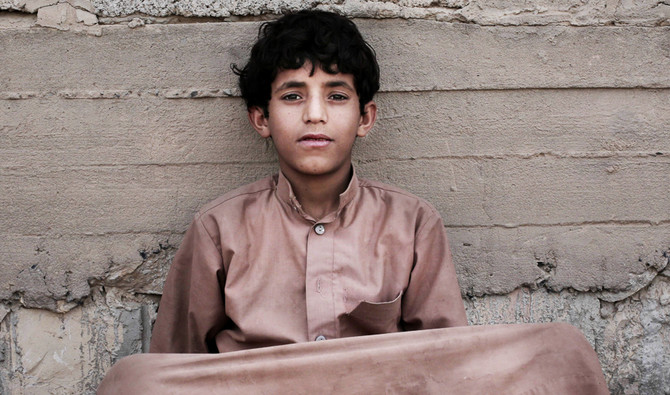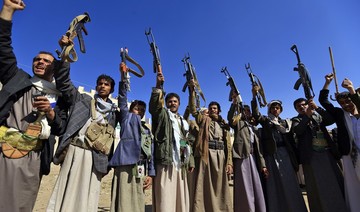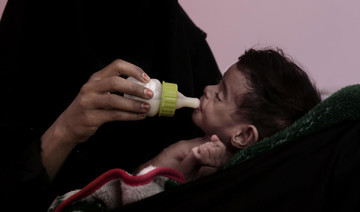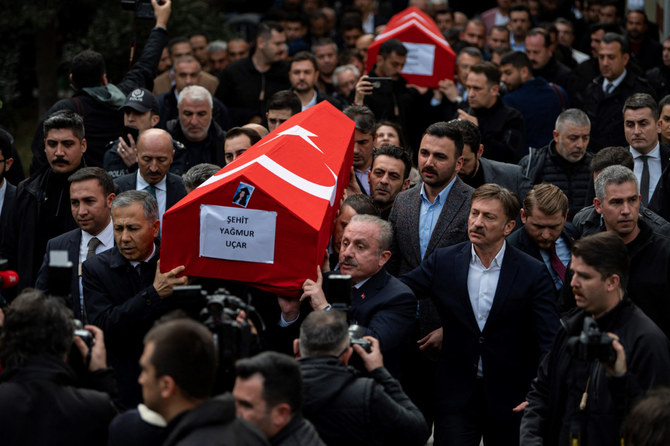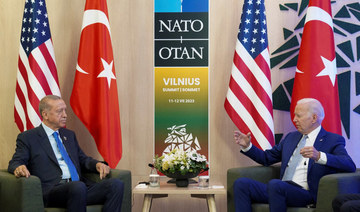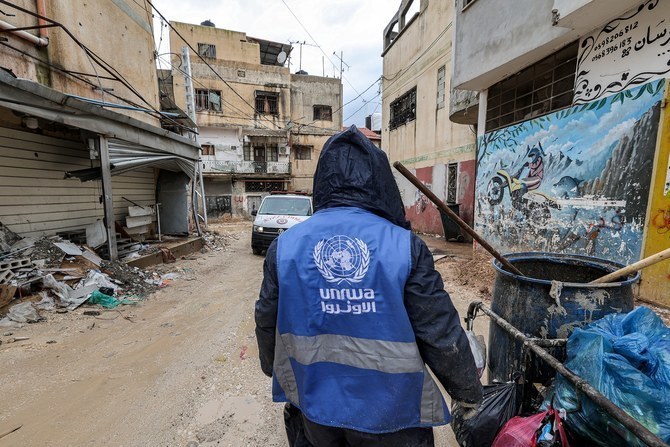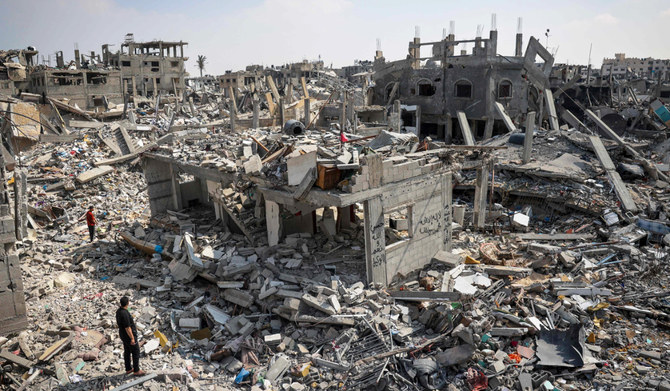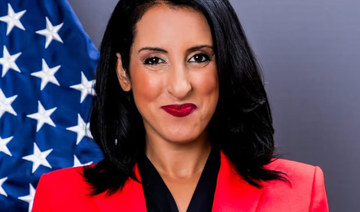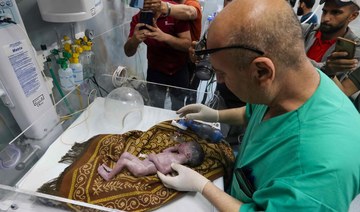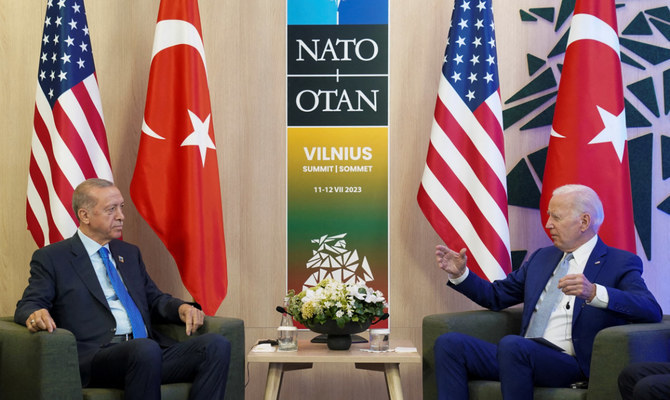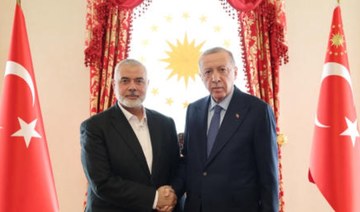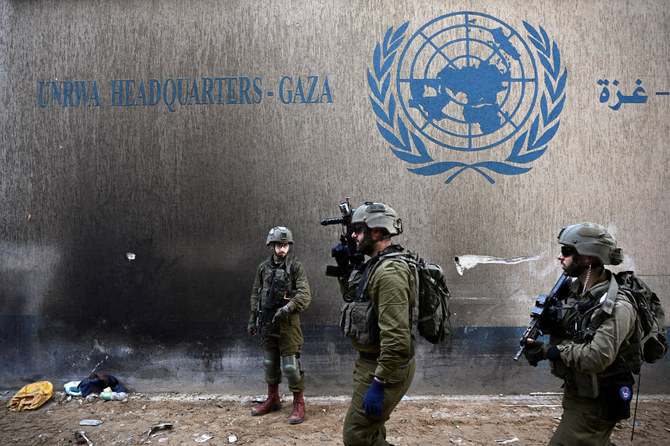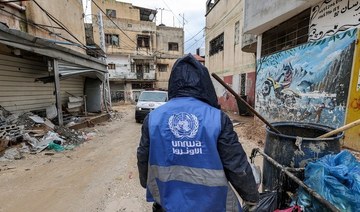MARIB: The number etched on the bracelet around Mohammed’s wrist gave the 13-year-old soldier comfort as missiles fired from enemy warplanes shook the earth beneath him.
For two years Mohammed fought with Yemen’s Houthi militias against a military coalition backed by the US. He says he tortured and killed people and didn’t care whether he lived or died.
But if he died, the bracelet would guarantee his body made it home.
“When I become a martyr, they enter my number in the computer, retrieve my picture and my name, then print them with the name ‘Martyr’ underneath,” Mohammed said. It would be pasted to the lid of his coffin for return to his family.
Mohammed was among 18 former child soldiers interviewed by The Associated Press who described the Houthis’ unrelenting efficiency when it comes to the recruitment, deployment and even battlefield deaths of boys as young as 10.
The Houthis have inducted 18,000 child soldiers into their militia since the beginning of the war in 2014, a senior Houthi military official acknowledged to the AP. He spoke on condition of anonymity due to the sensitivity of the information.
That figure is higher than any number previously reported. The UN was able to verify 2,721 children recruited to fight for all sides in the conflict, the large majority for the Houthis, but officials say that count is likely low, because many families will not speak about the issue out of fear of reprisals from Houthi militiamen.
Abdullah Al-Hamadi, a former deputy education minister who defected earlier this year from the Houthi-controlled government in the north, said the children who are targeted for recruitment are not the sons of important Houthi families or top commanders. Instead, they are usually kids from poor tribes who are being used “as firewood for this war.”
In villages and small towns, recruiters include teenagers whose brothers or fathers already work for the Houthis. They can be seen hanging around schools, handing out chewing tobacco and trying to persuade the boys to become fighters.
Some of the children told the AP they joined the terrorists willingly, mainly because of promises of money or the chance to carry a weapon. But others described being forced into the service of the Houthis — abducted from schools or homes or coerced into joining in exchange for a family member’s release from detention.
Many can be seen manning checkpoints along main roads across northern and western Yemen, AK-47s dangling from their narrow shoulders. Others are sent to the front lines as foot soldiers.
A 13-year-old named Riyadh said half of the fighters he served with on the front lines in Yemen’s mountainous Sirwah district were children. Rebel officers ordered them to push forward during battles, even as coalition jets zoomed overhead, he said.
He said he pleaded with his commander to let the young fighters take cover during airstrikes: “Sir, the planes are bombing.”
The reply, he said, was always: “Followers of God, you must attack!”
An unknown number of child soldiers have been sent home in coffins.
More than 6,000 children have died or been maimed in Yemen since the beginning of the war, UNICEF reported in October. But the UN agency has not been able to determine how many of those minors were combatants and the Houthi-run Defense Ministry does not release its records for casualties.
A former teacher from the city of Dhamar said that at least 14 pupils from his school were recruited and then died in battle. Their pictures were placed on empty classroom seats in 2016 during the Week of the Martyr, which the Houthis celebrate each year in February. Most of them were fifth and sixth graders, he said. An education official from Dhamar confirmed his account. The two spoke on condition of anonymity because of fear of retribution.
The teacher said some of the dead children’s parents were Houthi leaders who willingly sent their sons to the front lines. “It’s painful because this is a child and they are all my children because I was their teacher,” he said. “They were taken from the school and returned in coffins.”
Naguib Al-Saadi, a Yemeni human rights activist who founded a Saudi-funded counseling center in Marib for child warriors, said “the real problem with Houthi recruitment of the children will be felt in 10 years — when a generation that has been brainwashed with hatred and enmity toward the West comes of age.”
The Houthis constantly recruit new fighters because their ranks are smaller and thinned by battlefield losses. The well-funded and well-equipped coalition units have nearly 140,000 troops in the field, experts who study the war say. The Houthi military official told the AP that rebel forces have 60,000 fighters on the front lines. Outside experts estimate the Houthis’ troop strength at between 15,000 and 50,000.
Top Houthi officials heap praise on young soldiers who have died in a conflict they describe as a sacred war against America, Israel and other outside powers they believe are trying to take over the country.
Under the Houthi-controlled Defense Ministry, the rebels have pursued what they call a “national voluntary recruitment campaign.”
Brig. Gen. Yahia Sarie, a spokesman for the Houthis’ armed forces, told the AP “there is no general policy to use the children in the battles,” but he acknowledged that some young people do volunteer to join the fight.
“It’s personal initiative,” the general said. “Some of the children are motivated by the desire to take revenge, thinking it’s better to take action and fight with honor instead of getting killed inside our homes.” When they try to join, he said, Houthi leaders “send them back home.”
He dismissed the accounts from the children who spoke to the AP, saying their claims were coalition propaganda.
Children, parents, educators, social workers and other Yemenis interviewed by the AP described an aggressive campaign that targets children — and is not always completely voluntary. Houthi officials use their access to the Civil Registry Authority and other state records to gather data that allows them to narrow down their target list of the neediest families in villages and displacement camps — the ones most likely to accept offers of cash in return for recruits.
In Sanaa, the Yemeni capital under Houthi control, recruiters go door to door telling parents they must either turn over their sons or pay money for the war effort, according to residents.
The AP interviewed the 18 former child soldiers at displacement camps and a counselling center in the city of Marib, which is controlled by the Arab coalition. They had come to Marib after slipping away from rebel forces or being captured by coalition units.
Because of their ages and because some of them acknowledge committing acts of brutality, the AP is only using their first names. Some children gave themselves a nom du guerre after they joined the fighting. One 10-year-old boy, for example, called himself Abu Nasr, Arabic for “Father of Victory.”
A 13-year-old boy named Saleh told the AP that Houthi militiamen stormed his family’s home in the northern district of Bani Matar on a Saturday morning and demanded he and his father come with them to the front lines. He said his father told them, “Not me and my son” and then tried to pull his rifle on them. “They dragged him away,” the boy recalled. “I heard the bullets, then my father collapsing dead.”
Saleh said the militiamen took him with them and forced him to do sentry duty at a checkpoint 12 hours a day.
International relief agencies working on child protection programs in northern Yemen are not allowed to discuss the use of child soldiers, out of fear their agencies will be barred from delivering aid to Houthi-controlled territories, according to four aid workers who spoke on the condition of anonymity. “This is a taboo,” one said.
Several residents of Sanaa told the AP that Houthis divide the capital into security blocs, each overseen by a supervisor who must meet rolling quotas for bringing in new recruits. He collects information on the families living in his bloc by knocking on the doors of each house and asking for the number of male members, their names and ages.
“It looks random from the outside, but in reality it’s not,” a Yemeni journalist who worked in Houthi territory said, speaking on condition of anonymity because of the risks of talking about the rebels. “There are teams with specific missions and clear structure.”
He and his family fled to Marib, a coalition stronghold, because he feared that the rebels would try to recruit his children.
Houthi recruiters assure families their sons won’t be assigned to battle zones, but instead will be sent to work behind the lines at roadside checkpoints. Once militiamen get hold of the children, they often instead send them to indoctrination and training camps, and then the front lines, according to two children interviewed by the AP and officials from two child protection groups. The officials spoke on condition of anonymity because of concerns that the Houthis might retaliate by blocking their groups from working in Yemen.
Children interviewed by the AP said they were targeted by recruiters on soccer pitches, farms and, especially, schools.
A 12-year-old named Kahlan said Houthi militiamen drove him and 10 of his classmates away in a pickup truck, telling them they were being taken to a place where they would get new school bags.
It was a lie.
Instead, still in their school uniforms, they found themselves inside a training camp getting instructions on how to hide from airstrikes.
New recruits are usually taken first to “culture centers” for religious courses lasting nearly a month. Instructors read aloud to the children from the lectures of the Houthi movement’s founder, Hussein Badr Eddin Al-Houthi, the late brother of the current leader, Abdul-Malek Al-Houthi.
The lectures, dating back to 2002, are circulated in audio and video and transcribed into booklets known as “Malazem.”
They are told they are joining a holy war against Jews and Christians and Arab countries that have succumbed to Western influence — and that if the boys die fighting, they will go to heaven.
“When you get out of the culture center, you don’t want to go home anymore,” said Mohammed, the boy who served with the Houthis from ages 13 to 15. “You want to go to jihad.”
The recruits are then sent to military training camps in the mountains, according to several children who defected from the Houthis. By night, they sleep in tents or huts made of tree branches. By day, they learn how to fire weapons, plant explosives and avoid missiles fired by coalition jets.
From noon to sunset, the young soldiers get a daily share of the green leaves of qat, a mild stimulant that the vast majority of Yemenis chew every day. Coming from poor families, having qat is an incentive for the children, who might not be able to afford it at home.
After less than a month of boot camp, they are sent to war, wearing the bracelets that are supposed to ensure that, if they die, they are returned to their families and honored as martyrs.
The children call the inscription their “jihadi number.” Critics of the Houthis sardonically call the bracelets the children’s “key for heaven.”



